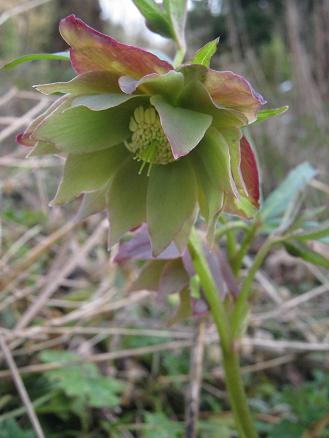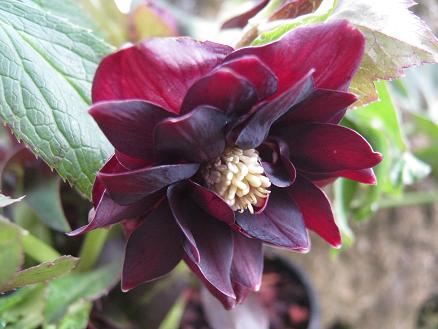JEARRARD'S HERBAL
Thats enough introduction - on with the plants!
To navigate this site, use the links above, or the detailed links at the bottom of this page.
... out in the garden.
7th February 2010

Galanthus 'Blewberry Tart' .
All week I have been waiting for the sudden return of the freezing weather, to remind me that winter still has a sting in the tail, but temperatures have stayed up
and the spring has advanced in leaps and bounds, so I am becoming convinced that the worst is over.
For a couple of weeks in mid-winter I wonder if there will be enough new to show on this page, but this morning I went out and took 310 pictures in the garden -
the season of garden austerity is over! The garden is also full of double flowered forms, so perhaps this is a good time for a few of them.
I don't think there is a double snowdrop that people admire universally for its precision and beauty, and this one is certainly not in contention
for the title of 'most beautiful'. It is distinctive, and green, and well displayed, but (rather like myself) it is more curious than beautiful.
It is also quite vigorous, and the hybridist in me is wondering if it produces viable pollen...hybrids with 'Wendys Gold' would be really interesting,
if only I could remember where I buried the gold (though it is probably hardy showing yet).
7th February 2010
 Galanthus 'Hill Poe' .
Galanthus 'Hill Poe' .
This is without doubt my best year with 'Hill Poe'. It sulked for a long time in a pot, producing rather ordinary double flowers
until I finally found a space for it under the trees. At long last it is producing flowers with extra outer segments and tidy rosettes
of inner segments. A chilly wind today has kept many of the snowdrops from opening fully, so the choice of which to photograph
has been made easier for me.
While on the subject of double snowdrops, last week I noted how green 'Lady Elphinstone' was this year - this week I have a flock of yellow flowers,
so perhaps the good lady simply enjoys being contrary.
7th February 2010

Helleborus Montenegran Double .
When I took down some trees last year, I let a lot more light into the Hellebore beds, and have had a great deal more weed growth as a result.
It is going to take some time to get it sorted out, and for the replacement shelter to grow, so I have been anxiously peering at the weedy
debris looking for the unrolling growth of the larger plants so that I can safely weed around them. This H.torquatus form produces so
little growth at flowering time, that the first thing I noticed were the flowers. I have two clones planted next to eachother, with the intention of raising
a tiny army of seedlings, but one seems to flower a fortnight before the other, and the period of overlap has been shockingly brief so far. I am not really
on the lookout for new Hellebores this year, but if I saw any more 'Montenegran Doubles' I would make a little cluster of them to ease the problem of overlap.
In general terms, I always look for the purest colours in hellebore seedlings. Muddy colours and indistinct spotting are easy enough to produce
without seeking them out. However, if I am going to grow muddy colours, this is my idea of perfect. (I also grow a couple of plants of H. x hybridus
that I call 'double chocolate', but they are delightfully funny rather than delightful.)
7th February 2010

Helleborus x hybridus Double Purple .
I have good breeding parent plants in a number of colours, but I have very few double blacks. I can be more exact - I have three. The first two
are on the edge of the hellebore beds and seem determined to remain chaste until senility grasps their passionless bodies in its cold embrace.
This is the third, and it is a vigourous plant which will shortly be joining them. The hope is that one or other of the determined virgins
will lose it's inhibitions and indulge in some 'under the petticoat' action.
This isn't the best black I have seen - more of a dark purple (though it is closer to black than the picture shows), but if it produces seedlings I will be happy enough.
Last spring I bought a handful of year old double black seedlings on e-bay which are currently fattening up in pots, but I doubt I will see
double black flowers from them this year, or possibly ever. So far all I have been able to confirm is that they are hellebores!
To find particular groups of plants I grow, click on the genus name in the table above. Click on the "Index" box at the top of the page for the full list.
I have a lot of good intentions when it comes to updating this site, and I try to keep a note
about what is going on, if you are interested.
If you want to contact me, the address is infoMONKEYjohnjearrard.co.uk
When typing the address in, please replace MONKEY with the more traditional @ symbol! I apologise for the tiresome performance involved, but I am getting too much
spam from automated systems as a result of having an address on the front page.

 Galanthus 'Hill Poe' .
Galanthus 'Hill Poe' . 
